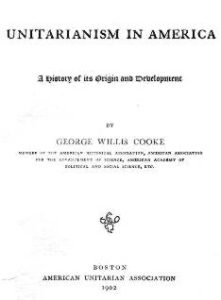
George Willis Cooke (April 23, 1848-April 30, 1923), born in Comstock, Michigan, was a Unitarian minister, writer, editor, and lecturer best known now for his landmark history of the Unitarian movement in the 19th century and for his work on transcendentalist writers and publications. An insatiable reader throughout his life, Cooke was largely self-taught. He studied at the Meadville Theological School in 1872, but never received an academic degree. Ordained in June, 1872, he served in the parish ministry for the next 28 years, though he was actively engaged in writing and editorial work as well. Cooke served Unitarian churches in Sheboygan, Wisconsin, 1872-73; Sharon, Massachusetts, 1873-76; Grand Haven, Michigan, 1876-78; Indianapolis, Indiana, 1878-80; Dedham, Massachusetts, 1880-87; Sharon, Massachusetts, 1887-91; East Lexington (Follen), Massachusetts, 1891-97; and Dublin, New Hampshire, 1898-1900.
In 1900 Cooke left the ministry to devote himself full time to scholarship and lecturing. He gave courses at the Rand School of Social Science in New York and at the Boston School of Social Science. A major theme of his lectures, given throughout the country, was the need to reform the country’s unjust industrial and economic system. He returned to ministry in 1922, serving the Federated Congregational-Unitarian Church in Francestown, New Hampshire.
George Willis Cooke and Lucy Nash were married in 1872; they had two daughters, Florence and Marian. A widower, Cooke married Mary Lydia Leggett on his 75th and her 67th birthday in April, 1923. Leggett, also a Unitarian minister, was one of the first women to attend Harvard Divinity School. He died suddenly a week after the wedding, at her home in Revere, Massachusetts.
Cooke was an incisive and original thinker with a deep commitment to social reform, particularly economic reform. Theologically, he was a radical, an evolutionary socialist who preached “collectivism” from pulpit and platform—in politics, democracy; in industry and social relations, cooperation; in religion, brotherhood.” “With the coming of collectivism,” he wrote, “the ‘kingdom of God’ will become a republic of man, the ‘Lord’ of the church will become the brother of the poor, and the church itself will become a brotherhood of those who desire to live as helpers of their kind.”
Apart from his service to congregations, Cooke made his greatest contributions to the Unitarian movement as an author and editor. With Jenkin Lloyd Jones and others he was one of the founding editors of the midwestern Unitarian magazine, Unity, in 1878. His first major work, published in 1881, was Ralph Waldo Emerson: His Life, Writings and Philosophy. He wrote several other studies of transcendentalism, with particular attention to the utopian community, Brook Farm, and the transcendentalist periodical, The Dial. His book, Unitarianism in America, first published in 1902, was the standard work on 19th century Unitarianism for some time and is still the major source of information on Unitarian developments in the early decades after the Unitarian controversy.
Cooke was author or editor of some twenty books on a wide range of subjects, establishing him as an important literary figure. At the time of his death he was working on a projected four volume work, tentatively titled “The Progress of Women in Civilization.” The Social Evolution of Religion, the last of his books to be published during his lifetime, was reprinted in 1985. However, the literary world, rather than the religious, has been the source of continuing interest in his work because of his connection with and interest in transcendentalist authors.
Sources
Some correspondence of Cooke is in the Lester Frank Ward Papers at the John Hay Library at Brown University in Providence, Rhode Island. A number of Cooke’s pamphlets and sermons are collected at the Andover-Harvard Theological Library in Cambridge, Massachusetts.
Among Cooke’s books are Ralph Waldo Emerson: his life, writings, and philosophy (1881), George Eliot: a critical study of her life, writings, and philosophy (1883), A history of the Clapboard Trees or Third Parish, Dedham, Mass.: now the Unitarian Parish, West Dedham, 1736-1886 (1887), A guide-book to the poetic and dramatic works of Robert Browning (1891), The spiritual life; studies of devotion and worship (1893), John Sullivan Dwight, Brook-farmer, editor, and critic of music; a biography (1898), The poetic and dramatic works of Robert Browning (1899), Unitarianism in America: a history of its origin and development (1902), An historical and biographical introduction to accompany the Dial (1902), A bibliography of James Russell Lowell (1906), A bibliography of Ralph Waldo Emerson (1908), and The social evolution of religion (1920). Cooke also contributed numerous articles to the New England Magazine and other periodicals. Among his articles for the New England Magazine were “Harriet Beecher Stowe” (1896), “Brook Farm” (1897), “Concord History and Life” (1898), and “Emerson and Transcendentalism” (1903). He edited Early letters of George Wm. Curtis to John S. Dwight; Brook Farm and Concord (1898) and The poets of transcendentalism: an anthology (1903), and was one of the editors of The works of Theodore Parker (1907-1911).
Jabez T. Sunderland wrote “George Willis Cooke: An Appreciation,” in Unity (June 14, 1923), an edited version of which appeared in the Christian Register (July 12, 1923). There are obituaries in the Unitarian Year Book (1923-24) and the Christian Register (May 17, 1923).
Article by Charles A. Howe
Posted October 28, 2000